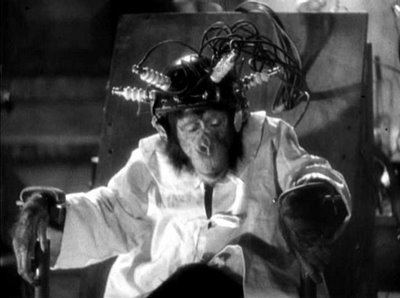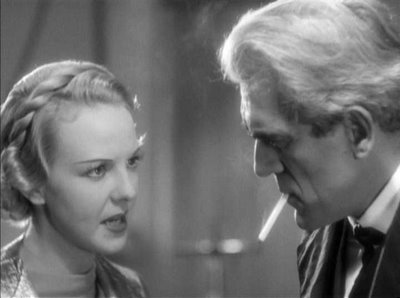 Dr. Laurience (Boris Karloff) reacts as his theories are ridiculed by boorish peers in THE MAN WHO CHANGED HIS MIND.
Dr. Laurience (Boris Karloff) reacts as his theories are ridiculed by boorish peers in THE MAN WHO CHANGED HIS MIND.
THE MAN WHO CHANGED HIS MIND
1936, Shanachie/Carlton International, DD-2.0, $19.98, 62m 42s, DVD-1
Originally released in the States as THE MAN WHO LIVED AGAIN, this Gaumont-British production is easily misfiled among the "Mad Doctor" titles that Boris Karloff made for Columbia five years later. Here, Karloff stars as the chain-smoking, musty-looking Dr. Laurience (pronounced "Lorenz") , who has somehow developed a two-seated apparatus in his Genoa retreat capable of extracting "thought content" from the human mind and either storing it or transmitting it into the brain of a new host. Dr. Claire Wyatt (Anna Lee), one of the new 1930s breed of willful female scientist, breezily sidesteps the marriage proposal of Dick Haslewood (John Loder), the sole son and heir of millionaire publisher Lord Haslewood (Frank Cellier), in order to assist Laurience. Though her coachman disagrees ("I don't go to THAT door!" he says, dropping her bags at the curb), Claire rather likes Laurience, understanding his scientific dedication, but she is repelled by his wheelchair-bound associate Clayton (Donald Calthrop) who, of course, has been promised that his thoughts will someday reside in a more perfect body.
Dick's attempts to get Claire fired by planting an exploitative newspaper story about Laurience backfire, and Lord Haslewood, thrilled to recognize a genius, sponsors the scientist's relocation to London, where he spends a year upgrading his laboratory and finessing his work before announcing his discovery to an assemblage of peers. In an astonishingly abrupt reversal of fortune, the medical establishment (led by an actor who resembles Russ Meyer) ridicule him and Lord Haslewood curtly withdraws his support... but Laurience insures the continuation of his work by performing a quick switcheroo between Lord Haslewood and Clayton, whose crippled body dies moments after receiving Haslewood's fund of memories.

Dr. Laurience's experiment -- shades of Medfield College!
The most surprising aspect of this mind-boggling melodrama is its keen and immediately apparent sense of fun. Directed by Robert Stevenson from a script involving John L. Balderston (THE BRIDE OF FRANKENSTEIN), it actually plays like one of Stevenson's later "Medfield College" comedies for Disney -- THE MISADVENTURES OF MERLIN JONES and THE MONKEY'S UNCLE, particularly -- with some James Whale characters tossed into the salad. The early scenes between Lee and Loder are overly strident in their gaiety and seem over-rehearsed and hurried, making a bad initial impression; but by the time Karloff trots out the chimps to demonstrate his invention, and Clayton utters the memorable line, "I wonder which revolts you more -- my miserable body or my perverted mind?", we relax and let this amusing hour-killer take us where it will. (Incidentally, the most perverted thing to explicitly cross Clayton's mind is that the mise-en-scène could use a little piano-playing.) Even so, the movie only truly blooms when Frank Cellier and Donald Calthrop get to have fun by swapping performances, as Loder and Karloff also get to do later. Karloff's decision to smoke in literally every scene initially seems an inspired performance tic (it really brings out the Jeremy Irons in him), but the script makes the habit relevant to the final twists of narrative, making it too obvious a tic in hindsight. The photography by Jack Cox (DOCTOR SYN, THE LADY VANISHES) is crisp and inventive, using double exposed montages to reinforce the film's theme of ideas in conflict, and the employment of background music (uncredited) is occasionally innovative. Karloff and Anna Lee (here a luminous and spirited, if ultimately unimportant heroine) would memorably cross paths once again in the Val Lewton production BEDLAM (1946). The production's uncredited make-up artist was Roy Ashton, later much-revered for his contributions to 1960s' Hammer Films.

Anna Lee gives chain-smoker Karloff a piece of her mind.
This 2004 DVD release in Shanachie's "British Cinema Collection" series is absolutely no-frills, but it preserves a fairly immaculate copy of a film that was decidedly hard to find in watchable form prior to its release. The Carlton International credit tips off the fact that the source materials were recorded in PAL (25 frames per second), and the 24 f.p.s. NTSC conversion makes an already brisk film unreel at even more determined pace. (Had the source element run at the correct speed, its running time would translate to 65m 22s.) The audio restoration is also of particularly fine quality for a British film of this period, digitally enhancing dialogue while taking care not to eliminate too much of the background crackle of the soundtrack.
A droll aperitif for double-billing with Douglas Trumbull's BRAINSTORM (1983), THE MAN WHO CHANGED HIS MIND works best if approached not as a vintage horror film, but rather as a tongue-in-cheek entertainment with macabre overtones. It also makes one regretful that Karloff never decamped from AIP in the 1960s long enough for "Dr. Laurience" to rear his unkempt head again over at Disney, as one of the more venerable scrambled eggheads at Medfield College.